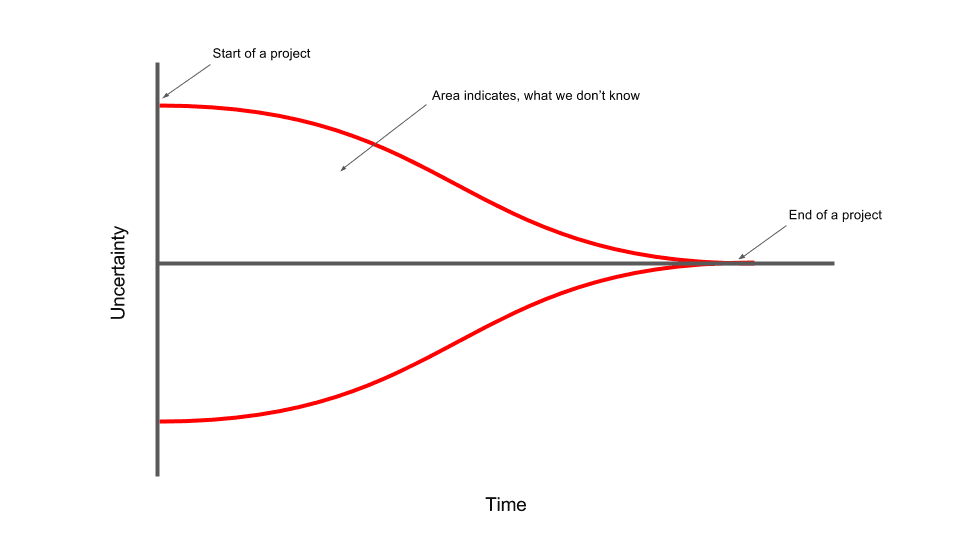Software development is like building a house. Estimating the cost will be simple with a clear architectural plan, design mockup, and home decor vision. Nevertheless, if all one has is an idea, the best one can hope for is a general pricing range. So, what should one do to obtain more precise figures?
Steve McConnell and Barry Boehm's concept of the Cone of Uncertainty depicts how software estimation might deviate from reality depending on the stage of development. In short, the more information one can offer, the more accurate the estimate will be.
This article provides principles for estimating software engineering costs. We will discuss influencing factors, estimation techniques, and price model possibilities in detail. Continue reading to learn more.
What is Custom Software Development?
Custom Software Development is the process of designing, developing, and deploying software applications tailored to meet the specific needs of a particular organization or user. It involves creating software from scratch, which is customized to meet the unique requirements of the user, unlike off-the-shelf software, which is designed to cater to a broad audience. Because it meets the specific requirements of the organization, which result in increased productivity, improved efficiency, and cost savings in the long run.
Why Do Companies Need Custom Software Development?
Companies may require custom software development for various reasons, including specialized company demands, increased efficiency and productivity, long-term cost savings, scalability, integration with current systems, and competitive advantage. According to GrandviewResearch, the global bespoke software development market is expected to increase at a compound annual growth rate (CAGR) of 22.3% between 2022 and 2030.
Cost Estimate for Software Development
Estimating custom software development costs involves identifying and calculating all the expenses associated with the project, including development time, personnel costs, software and hardware requirements, and other related expenses. By estimating the costs in advance, the project team can ensure that they have sufficient budget and resources to complete the project and can make adjustments as needed to stay on track. The following steps can be followed to estimate:
1. Split the project into phases. Development, testing, and maintenance are the major phases of Agile development.
2. Divide the phases into smaller parts. A wireframe can then be broken down into a detailed design stage. Each individual feature can be completed during the development phase.
3. Estimate the duration of each subphase. Here, one may need a consultation from a specialist in every development-related field.
4. Establish an acceptable time limit and determine how many employees are needed to complete all the tasks on time.
5. Determine the scope of HR resources for each development phase. This involves recruitment, training, rewards, etc.
6. Establish acceptable payment rates for every professional involved in the project.
7. Expenses like office equipment, project management, etc., are included as fixed costs.
8. Then add up all the costs associated with employee wages. Inflation, hardware malfunctions, and other risks should be taken into account.
Also, Read: What is Technical Debt in Software Development - How to Identify & Manage?
Custom Software Development Cost Estimation Techniques
Among the many elements, one that contributes to effective software development is accurate software cost estimation. The techniques given below can help comprehend the difficult process of estimating software costs based on a reasonable amount of work, time, and money. These will help in estimating the average Cost Of Custom Software Development:
1. Empirical Estimation Technique
The empirical estimation technique calculates software development costs using data from previous projects and gathers information based on assumptions and a little guesswork. Following that, evidence-based cost-estimating algorithms are employed, and the company is given a preliminary estimate of the software development cost during the planning process.
This method of software development cost breakdown necessitates prior experience implementing a similar solution. Despite the empirical estimation technique being primarily dependent on guesswork, it has been known over the years to provide clear-cut rough cost estimates. While applying this cost-estimating technique, a software development business will often utilize expert judgment and the estimate-talk-estimate approach (ETE), a systematic and qualitative forecasting method involving polling a group of experts via many rounds of questions.
2. Heuristic Estimation Technique
The heuristic technique can also be used to determine the average cost of software development. This strategy or model handles cost estimation from numerous perspectives and is the most practical way to make quick decisions on complex projects. The model provides a cost estimate by addressing the relationships between the project's many aspects and factors.
The Constructive Cost Model (COCOMO), which uses a regression model to compute the cost of the program, is an example of a heuristic technique used to calculate software development costs.
3. Analytical Estimation Technique
This cost estimation method divides the task into many processes or parts. Following that, the normal time for each operation is applied based on experience. A professional with prior experience estimating the cost of similar projects and understanding the critical workflows perform the process.
Now to understand the various software development cost approaches, one must understand the many sorts of estimations. The software development business provides these estimates based on the project goals, requirements, and the information mentioned during the scoping session.
Factors Affecting Custom Software Development Costs
Several factors can influence custom software development costs, which organizations must carefully examine when planning and budgeting for a bespoke software development project.
1. Complexity
The greater the project's complexity and scope, the more resources and effort will be required to finish it, resulting in higher expenses.
| Types of Software | Time Frame (Months) | Cost (Approx.) |
|---|---|---|
Basic Software | 2-3 | $10K to 45K |
Medium Complex Software | 3-6 | $50K to 85K |
Highly Complex Software | 6-9 | $90K to 200K |
2. Scope of the Project
Companies must identify the scope of the project and ensure that the project objectives and requirements are well-defined.
The cost of software development will also vary depending on the type of software project and project size. These will decide how many developers we require and how much time and work it will take them to complete our project. The table below depicts the relationship between project size, the scope of work, and the time necessary to finish it. The table below shows the hourly cost of different project types:
| Software Project Type | Average Hours | Average Cost |
|---|---|---|
New Software Development Project | 500+ | $20K+ |
Minor/Major Software Modifications and Tweaking | 5+ | $100+ |
Software Integration Into Existing Solutions | 5+ | $100+ |
Web Development | 42+ | $500+ |
Mobile Development | 250+ | $10K+ |
| Project Size | Avg. Time (Months) | Avg. Cost |
|---|---|---|
Small | 1+ | $1K-10K |
Mid-Scale | 4-10 | $10K-200K |
Large | 6+ | $200K- Above |
Enterprise | Continuous for years | Based on Individual project demands |
3. Team Size and Skillset
The size and skill set of the development team can also impact custom software development costs. Larger teams may result in higher costs due to the need for additional resources, whereas smaller teams may result in longer development times. Additionally, the skillset of the team members can affect costs, as specialized skills and expertise may be required for certain aspects of the project.
| Development Team | Average Hourly Cost |
|---|---|
Project Manager | $50-100 |
Software Architect | $30-100 |
Developer | $20-75 |
Designer | $15-50 |
QA Tester | $20-70 |
Business Analyst | $20-100 |
An analysis of onshore and offshore development is also necessary. Below is a table illustrating the hourly development cost in different geographical areas.
| Junior Developer | Senior Developer | Associate Developer |
|---|---|---|
$40-45(Europe) | $50-55(Europe) | $50-65(Europe) |
$90-100(North America) | $120-130(North America) | $140-150(North America) |
$30-35(South America) | $30-35(South America) | $40-60(South America) |
$20-30(Asia) | $25-35(Asia) | $40(Asia) |
4. Technology Stack
The use of newer and more advanced technologies may result in higher costs due to the need for specialized skills and expertise, as well as licensing fees for software and tools. In addition, development methodologies can also affect custom software development costs. Agile Approaches, for instance, require more frequent iterations and testing, while Waterfall methodologies require longer development cycles and higher costs because of their inflexibility.
5. Quality Assurance
Quality Assurance is a critical aspect of custom software development, and the level of testing and quality assurance required can impact costs. Higher levels of testing and quality assurance may result in higher costs due to the need for additional resources and time. An overview of software testing costs can be found in the following table.
| Custom Software Testing Type | Avg. Hours | Estimated cost |
|---|---|---|
Blackbox Testing | 100+ | $4K+ |
System testing | 70+ | $2K+ |
Integration Testing | 50+ | $1K+ |
Usability Testing | 50+ | $500+ |
Stress Testing | 20+ | $5K+ |
Feature Testing | 200+ | $1K+ |
Also, Read: Software Quality Metrics and KPIs: Choose the Right Metrics
Conclusion
Now, we can calculate Software Development Costs, which will be determined by various factors. Software development cost breakdown can be estimated while analyzing the mentioned factors. Some are evident, while others emerge only after delving deeply into the software development process.
The estimation will be more accurate if we go through the intricacies rather than just offering a generic concept to the development business. One can also lower the risks by validating the idea before developing a full-fledged product. As a consulting and product development agency, SoluteLabs offers web development, mobile development, UI/UX design, cloud services, and consulting services.
Get in touch with us today for your custom software development requirements.









